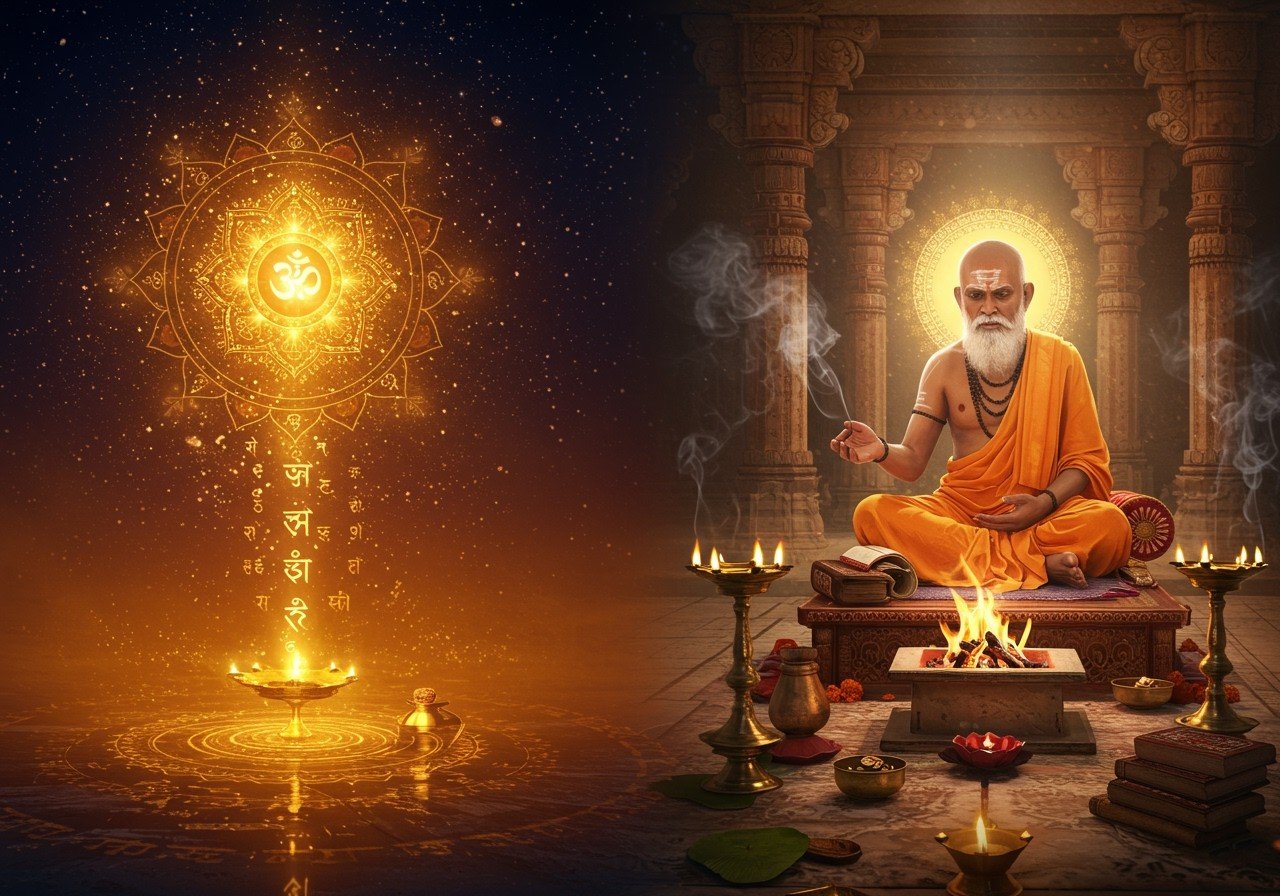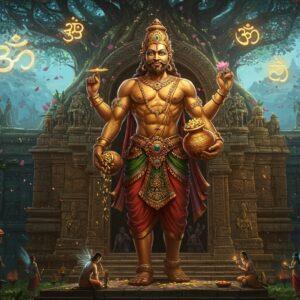
In the rich tapestry of Hindu philosophy, Brahman and Brahmin hold significant places. These two terms, though interconnected, represent different facets of Indian culture and spirituality. For those who cherish tradition, understanding these concepts enhances the appreciation of their cultural heritage. Over centuries, the meanings and roles of Brahman and Brahmin have evolved, influenced by historical contexts and spiritual insights.
Understanding Brahman: The Ultimate Reality
Brahman is a central concept in Hindu philosophy, representing the ultimate reality or universal spirit. It is infinite, eternal, and formless, existing beyond the physical universe. In Vedantic texts like the Upanishads, Brahman is the source of all existence. This concept can be seen in two aspects: Nirguna (without attributes) and Saguna (with attributes) Brahman.
- Nirguna Brahman: This is viewed as the impersonal, formless essence of the universe, transcending human comprehension.
- Saguna Brahman: This is perceived with attributes, allowing devotees to relate to a personal god, fostering a sense of connection.
Different schools of Hindu philosophy interpret Brahman uniquely:
- Advaita Vedanta: Views Brahman as non-dual and identical to the inner self (Atman), emphasizing the unity of all existence.
- Vishishtadvaita: Sees Brahman as the supreme being with qualities, integrating the personal and impersonal aspects of the divine.
- Dvaita: Considers Brahman as a separate, supreme entity distinct from the individual soul, highlighting the difference between the creator and the created.
Understanding these interpretations provides insight into how Hindu philosophy addresses the nature of existence and spirituality.
Understanding Brahmin: The Learned Custodians of Tradition
Brahmins stand as the revered custodians of knowledge and spirituality in Hindu society. They belong to the highest varna or caste, traditionally associated with priesthood and teaching. In ancient times, Brahmins held the sacred responsibility of preserving and interpreting the Vedas, the oldest sacred texts in Hinduism.
Historically, Brahmins performed rituals and ceremonies, guiding the community in spiritual matters. The Manusmriti, an ancient legal text, outlines their roles and duties. These include teaching, performing sacrifices, and studying the scriptures. Through the ages, the role of Brahmins has evolved. While many continue to fulfill traditional roles, others have ventured into diverse fields. Today, they balance modern careers with their rich cultural heritage.
Brahman vs. Brahmin: Clearing the Confusion
While Brahman is a philosophical concept, Brahmin refers to a social class. These terms often confuse people due to their phonetic similarity. However, their meanings are distinct. Brahmins serve as intermediaries between the material world and the spiritual realm of Brahman. Through rituals like Yajnas, they connect devotees with the divine. Understanding these differences enriches one’s appreciation of Hindu culture. It helps clarify the spiritual and social dimensions within this ancient tradition.
Brahman or Brahmin: Addressing Common Misunderstandings
Modernization and cultural shifts have influenced perceptions of Brahmins. Education and globalization have redefined their roles in society. Despite changes, many Brahmins strive to uphold traditional values while embracing contemporary life. Regional variations add to the complexity of these concepts. For example, in South India, there are specific practices unique to Brahmins there. To engage with these concepts today, individuals can explore both tradition and modernity. This balance allows one to maintain cultural roots while adapting to a changing world.
Cultural Significance and Modern Relevance
Brahman and Brahmin hold enduring cultural significance. Brahmins continue to preserve ancient rituals and knowledge, ensuring cultural continuity. Their contribution to society remains vital. Brahman, as a concept, appeals to spiritual seekers worldwide. Its universal nature transcends religious boundaries, offering insights into existence and consciousness. Brahmins face challenges balancing tradition with modern expectations. Yet, many successfully integrate their heritage into contemporary roles. These concepts remain relevant today, offering guidance and inspiration for those seeking to understand their cultural heritage deeply.
How Poojn.in Supports Brahmanical Traditions
Poojn.in offers essential items for Brahmin rituals and ceremonies that maintain the connection between Brahman and Brahmin practices. Our collection includes:
- Pure copper and brass items for daily rituals (nitya karma). Find authentic pieces crafted with care and precision.
- Traditional wooden items like achamani sets for purification ceremonies. Elevate your rituals with these beautiful and functional items.
- Authentic yagnopavit (sacred thread) made from high-quality cotton. Maintain tradition with these essential threads.
- Complete puja thali sets designed for Vedic ceremonies. Everything you need for your puja, conveniently bundled.
- Pure silver items for special rituals and offerings. Add a touch of elegance and purity to your ceremonies.
- Specialized darbha grass for sacred ceremonies. Sourced and prepared with utmost care for your rituals.
- Genuine rudraksha malas for spiritual practices. Enhance your meditation and spiritual connection.
We ensure all items meet traditional specifications and are crafted following ancient guidelines. Each product comes with proper care instructions to maintain its purity and sanctity. Our team verifies the authenticity and quality of all ritual items before listing them on our platform. For Brahmins performing regular pujas and ceremonies, we offer bulk ordering options and regular delivery schedules. Our packaging preserves the sanctity of these sacred items during transit. We ship across India with careful handling of these traditional items. Visit Poojn.in to explore our complete range of authentic puja items that support Brahmanical practices and traditions.
Embracing Tradition with Modernity
In understanding Brahman and Brahmin, we embrace a journey through the heart of Hindu culture and spirituality. These concepts, steeped in history, continue to guide and inspire. Brahmins, as custodians of tradition, adapt to modern times while preserving sacred knowledge. Brahman, as a spiritual concept, invites reflection and connection beyond boundaries. By appreciating these elements, we honor our cultural roots and find relevance in today’s world. This balance of tradition and modernity enriches our lives, offering a path of wisdom and peace. You can find resources and products to support your spiritual journey at poojn.in.
FAQs on Brahman and Brahmin
What is the difference between Brahman and Brahmin? Brahman is the ultimate reality, the cosmic principle, while a Brahmin is a member of a social class traditionally associated with priesthood and scholarship. The two are linked but distinct.
How is Brahman related to Hindu beliefs? Brahman is the core of Hindu philosophy, the source of all existence. Understanding Brahman is key to understanding Hindu cosmology and spiritual practice. Delve deeper into Hindu scriptures at poojn.in.
Why are Brahmins considered important in Hindu society? Brahmins traditionally held roles as priests, scholars, and teachers. They maintained and transmitted sacred knowledge, guiding the community in spiritual matters. Learn more about the significance of sacred offerings in Hindu rituals at poojn.in.
Can anyone become a Brahmin? Traditionally, Brahmin status is hereditary. However, changing social dynamics and interpretations suggest spiritual attainment and knowledge can elevate an individual’s spiritual standing.
Is Brahman worshipped in Hinduism? Brahman is not worshipped as a deity but is realized through spiritual practices like meditation and self-inquiry. Explore how to connect with your inner self through Hindu philosophy at poojn.in.
How does Brahman influence daily life in Hindu culture? The concept of Brahman encourages interconnectedness and harmony in all aspects of life, promoting ethical conduct and spiritual awareness. Discover the power of bhajans and kirtans in deepening your spiritual connection at poojn.in.
Why is the concept of Brahman considered complex? Brahman’s formless, infinite nature makes it challenging to define or fully grasp, leading to diverse interpretations within Hindu philosophy. Plan your spiritual retreat with our ashram stay guide at poojn.in.
Do Brahmins have a special role in understanding Brahman? Traditionally, Brahmins studied and interpreted scriptures, facilitating understanding of Brahman. However, realization of Brahman is accessible to any seeker through spiritual discipline and self-discovery. Find authentic Markin cloth for your puja needs at poojn.in.


